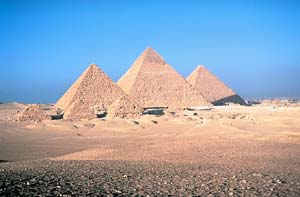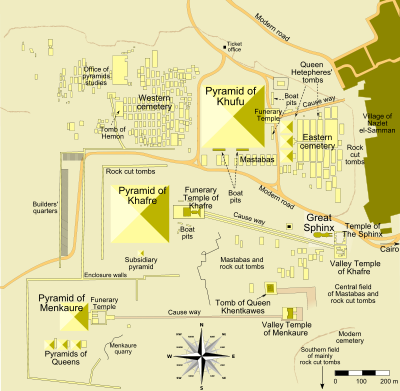Pyramids of Giza
 |
| Pyramids
of Giza |
This Ancient Egyptian necropolis consists of the Pyramid
of Khufu (also known as the Great Pyramid and the Pyramid
of Cheops; coordinates 29°58'31.3"N, 31°07'52.7"E),
the somewhat smaller Pyramid of Khafre (or
Chephren; coordinates 29°58'42.6"N, 31°08'05.0"E),
and the relatively modest-size Pyramid of Menkaure (or Mykerinus;
coordinates 29°58'19.8"N, 31°07'43.4"E),
along with a number of smaller satellite edifices, known as
"queens" pyramids, causeways and valley pyramids,
and most noticeably the Great Sphinx. Associated with these
royal monuments are the tombs of high officials and much later
burials and monuments (from the New Kingdom onwards), signifying
the reverence to those buried in the necropolis.
Of the three, only Khafre's pyramid retains part
of its original polished limestone casing, towards its apex.
It is interesting to note that this pyramid appears larger
than the adjacent Khufu pyramid by virtue of its more elevated
location, and the steeper angle of inclination of its construction
– it is, in fact, smaller in both height and volume.
The most active phase of construction here was in
the 25th century BC.
 |
Map of Pyramid Complex |
The ancient remains of the Giza necropolis have attracted
visitors and tourists since classical antiquity, when these
Old Kingdom monuments were already over 2,000 years old. It
was popularized in Hellenistic times when the Great Pyramid
was listed by Antipater of Sidon as one of the
Seven Wonders of the World. Today it is the only one of the
ancient Wonders still in existence.
Due largely to 19th-century images, the pyramids
of Giza are generally thought of by foreigners as lying
in a remote, desert location, even though they are located
in what is now part of the most populated city in Africa.
Consequently, urban development reaches right up to the
perimeter of the antiquities site, to the extent that in
the 1990s, Pizza Hut and KFC restaurants opened across the
road.
The ancient sites in the Memphis
area, including those at Giza, together with those at Saqqara,
Dahshur, Abu Ruwaysh, and Abusir, were collectively declared
a World Heritage Site in 1979.
Check out the following websites
for more information on Egypt and the Pyramids of Giza.
• http://www.pbs.org/wgbh/nova/pyramid
• http://www.gizapyramids.org
• http://www.guardians.net/hawass
• http://khufu.3ds.com/introduction/
|
|